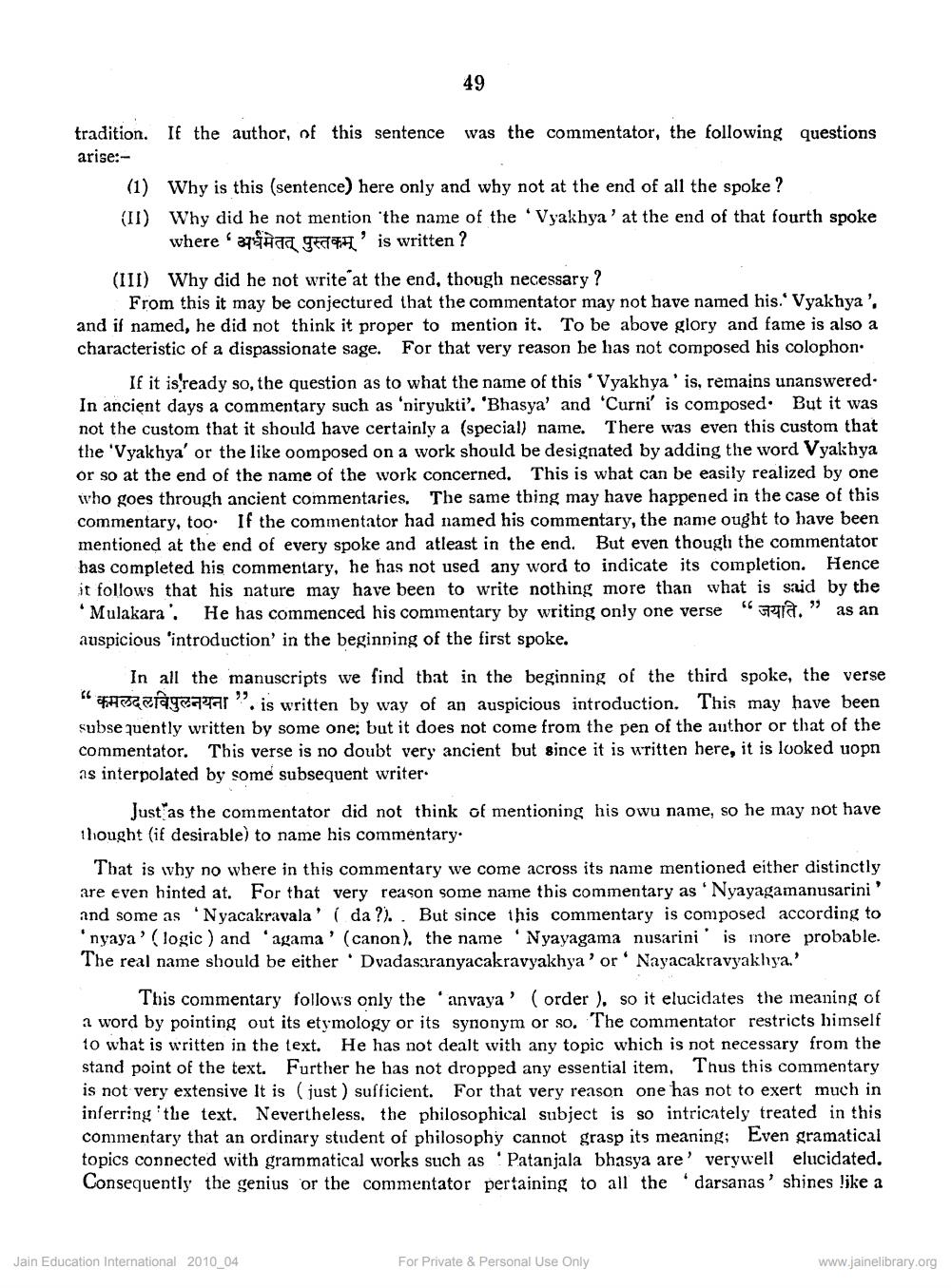________________
49
tradition. If the author, of this sentence was the commentator, the following questions arise:
(1) Why is this (sentence) here only and why not at the end of all the spoke ? (II) Why did he not mention the name of the Vyakhya' at the end of that fourth spoke
where 378 479 ' is written?
(III) Why did he not write at the end, though necessary?
From this it may be conjectured that the commentator may not have named his.' Vyakhya'. and if named, he did not think it proper to mention it. To be above glory and fame is also a characteristic of a dispassionate sage. For that very reason he has not composed his colophon.
If it is ready so, the question as to what the name of this 'Vyakhya' is, remains unanswered. In ancient days a commentary such as 'niryukti'. 'Bhasya' and 'Curni' is composed. But it was not the custom that it should have certainly a (special) name. There was even this custom that the 'Vyakhya' or the like oomposed on a work should be designated by adding the word Vyakhya or so at the end of the name of the work concerned. This is what can be easily realized by one who goes through ancient commentaries. The same thing may have happened in the case of this commentary, too. If the commentator had named his commentary, the name ought to have been mentioned at the end of every spoke and atleast in the end. But even though the commentator has completed his commentary, he has not used any word to indicate its completion. Hence it follows that his nature may have been to write nothing more than what is said by the 'Mulakara'. He has commenced his commentary by writing only one verse " la." as an auspicious 'introduction in the beginning of the first spoke.
In all the manuscripts we find that in the beginning of the third spoke, the verse "Hazragcatar". is written by way of an auspicious introduction. This may have been subsequently written by some one; but it does not come from the pen of the author or that of the commentator. This verse is no doubt very ancient but since it is written here, it is looked uopn as interpolated by some subsequent writer
Just as the commentator did not think of mentioning his owu name, so he may not have thought (if desirable) to name his commentary.
That is why no where in this commentary we come across its name mentioned either distinctly are even hinted at. For that very reason some name this commentary as 'Nyayagamanusarini and some as 'Nyacakravala' ( da?).. But since this commentary is composed according to 'nyaya' (logic ) and 'agama' (canon), the name 'Nyayagama nusarini' is more probable. The real name should be either 'Dvadasaranyacakravyakhya' or Nayacakravyakhya.'
This commentary follows only the 'anvaya' (order ). so it elucidates the meaning of 2 word by pointing out its etymology or its synonym or so. The commentator restricts himself 10 what is written in the text. He has not dealt with any topic which is not necessary from the stand point of the text. Further he has not dropped any essential item. Thus this commentary is not very extensive It is (just) sufficient. For that very reason one has not to exert much in inferring the text. Nevertheless, the philosophical subject is so intricately treated in this commentary that an ordinary student of philosophy cannot grasp its meaning; Even gramatical topics connected with grammatical works such as Patanjala bhasya are' verywell elucidated. Consequently the genius or the commentator pertaining to all the darsanas' shines like a
Jain Education International 2010_04
For Private & Personal Use Only
www.jainelibrary.org




